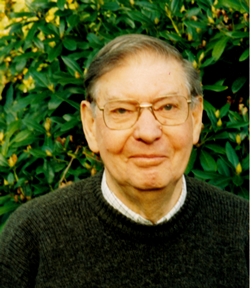 Igneous petrologist at Keele University who specialised in the Variscan granites of south west England
Igneous petrologist at Keele University who specialised in the Variscan granites of south west England
Colin Exley was a much valued colleague in the Geology Department of Keele University, where he taught Igneous Petrology for nearly 30 years. His researches on the granites and associated rocks of southwest England and his ready support of fellow-geologists and enthusiastic amateurs in that region attest to his life-long interest in that area and its distinctive geology.
He was also a highly regarded and generously supportive member of the wider geological community in North Staffordshire.
Exhibitioner
Born in Leeds in 1926, Colin attended the Grammar School there (as an Exhibitioner). He volunteered for service in the Royal Navy (1943-47), rising through the ranks from Midshipman to Sub-Lieutenant (and subsequently served until 1976 as a Lieutenant Commander in the Royal Naval Reserve).
Following demobilisation in 1947 he pursued the honours course in Geology at Oxford (Hertford College), graduating from there in 1951. He later returned to Oxford to undertake research on the St. Austell granite and associated rocks (including the celebrated china clays), gaining his DPhil in 1955.
Colin was employed in the laboratories of the British Ceramic Research Association in Stoke-on-Trent from 1951-57, where he gained useful experience in the then-prevailing techniques of geochemical analysis and an understanding of the economic value of the rocks in which he was already interested. In 1957 he successfully applied for a lectureship in the then-fledgling Geology Department of the recently founded (1949) University College of North Staffordshire that transmogrified into the University of Keele in 1962.
‘Commander’
Colin was promoted to Senior Lecturer in 1962 and remained at Keele for the rest of his academic career, lecturing mainly on Igneous Petrology and related topics until his retirement in 1985. He was acknowledged by students and staff colleagues as a thorough and conscientious teacher – who expected similar dedication from students and fellow staff-members (hence his affectionate nickname of ‘Commander’!). He also served with distinction on the University’s Senate and several of its academic committees.
Following his retirement Colin continued to live in the Keele area and maintained an active interest both in the steady expansion of the University (and how this impacted on local communities) and also in the rapid advances in petrological and geochemical knowledge and techniques over the following decades.
Colin’s interest in the rocks of southwest England was given a particular focus when in 1962 he helped to set up the Ussher Society, devoted to supporting all those with an interest in the varied and distinctive geology of that region. Over the following decades he was actively involved in the organisation of that body, as a committee member, acting as Treasurer for many years and serving three terms as Chairman.
He continued to participate in the annual meetings of that Society until recent years, when ill health rendered this impossible. In addition, Colin was a leading member of the North Staffs. Group of the Geologists Association, serving on its Committee for many years. He was awarded life-membership of that body shortly after retiring from Keele.
Variscan
Colin published extensively on petrological topics, mostly concerned with the mineralogy, geochemistry and petrogenesis of the Variscan granitic bodies of Cornwall and Devon. He was a major contributor to two important compilations dealing with the igneous rocks of the British Isles and also to an influential volume devoted to the Igneous Rocks of SW England, published by the Joint Nature Conservation Committee as part of the national Geological Conservation Review Series.
In a different context, starting during the 1960s Colin began to compile a detailed geological map of Keele University’s extensive campus. He regularly updated this to incorporate relevant data collected from temporary exposures created during the rapid expansion of University facilities in the last decades of the 20th Century. This database was subsequently utilised by BGS officers during their latest revision of the BGS Stoke-on-Trent 1:50,000 Sheet 123.
His wife of some 59 years, Averil (an ex-WREN whom he met when both were based in Malta) died in 2012 but he is survived by their three sons, and four grandchildren.
By P A Floyd & G Kelling, assisted by Keele colleagues and Colin’s family